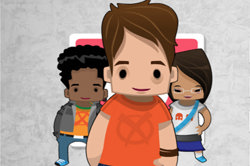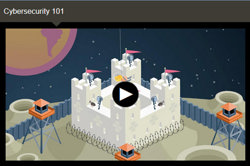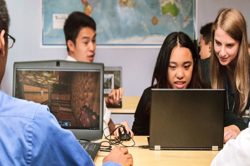Filter bubbles, bias, rabbit holes and nudging
This lesson focuses on the AI systems that recommend content in various applications that students use on a day-to-day basis. It draws on students’ ethical understandings during analysis of these systems. This lesson was developed by the Digital Technologies Institute in collaboration with the Digital Technologies Hub.
Additional details
| Year band(s) | 9-10 |
|---|---|
| Content type | Lesson ideas |
| Format | Web page |
| Core and overarching concepts | Privacy and security, Systems thinking, Impact and interactions |
| Australian Curriculum Digital Technologies code(s) |
AC9TDI10P01
Develop techniques to acquire, store and validate data from a range of sources using software, including spreadsheets and databases
AC9TDI10P14
Apply the Australian Privacy Principles to critique and manage the digital footprint that existing systems and student solutions collect
AC9TDI10P02
Analyse and visualise data interactively using a range of software, including spreadsheets and databases, to draw conclusions and make predictions by identifying trends and outliers
AC9TDI10P10
Evaluate existing and student solutions against the design criteria, user stories, possible future impact and opportunities for enterprise |
| Technologies & Programming Languages | Artificial Intelligence |
| Keywords | Artificial Intelligence, AI, artificial, intelligence, problem solving, my computer brain, Recommender system, ethics, ethical issue, ethical behaviour |
| Integrated, cross-curriculum, special needs | Digital Literacy |
| Organisation | ESA |
| Copyright | Creative Commons Attribution 4.0, unless otherwise indicated. |
Related resources
-

AI ethics - What's possible, probable and preferred?
The development and ubiquity of Artificial Intelligence raise a number of social and ethical matters that students can explore in the Digital Technologies classroom.
-

eSafety Commissioner: Video and resource library
Online safety resources for secondary schools supported by lesson plans and multimedia resources. Use the filters to find tailored resources suitable for your classroom needs.
-

NovaLab: Cyber security
These cyber security short animated videos each have a quick quiz to complete. The videos cover a basic intro into cyber security, hacking and privacy, cyber codes and there is a game too for students to apply their understandings.
-

Level Up: Game design
This unit of work is intended to teach years 9–10 students basic programming, using general purpose programming language.
-

Minecraft Lesson Plans
Find Minecraft lessons spanning primary and secondary school for use with your students.
-

Systems Thinking and AI applications
This lesson takes a systems thinking approach to understanding the place of artificial intelligence (AI) as a component within solutions to real world problems, such as predicting bushfire hotspots, spotting and monitoring animals in the wild, automated horticulture and agriculture, and early detection of medical issues.
-

Habits of a Systems Thinker
This lesson introduces some of the skills and concepts involved with Systems Thinking.
